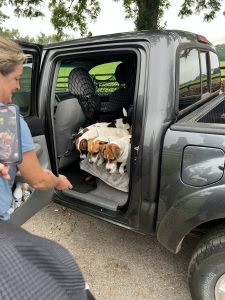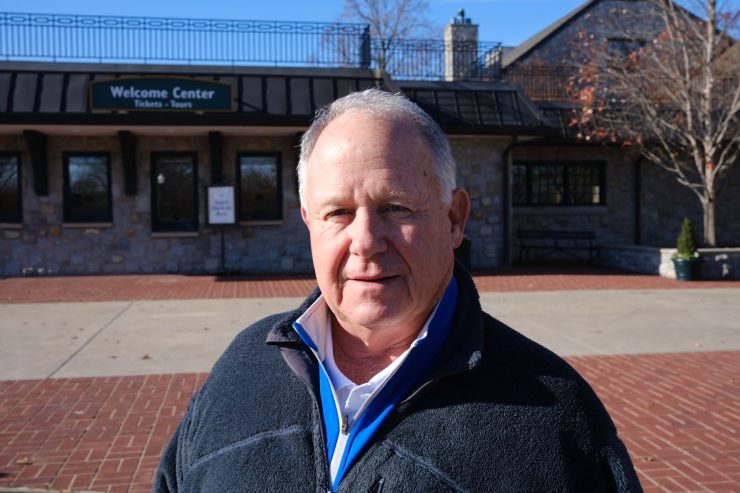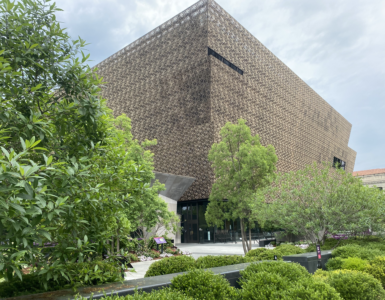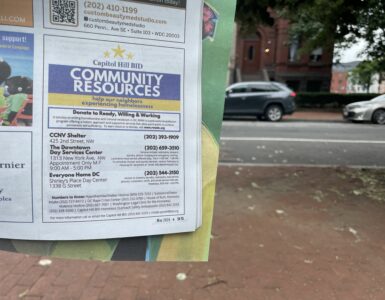It was 8 a.m. at Keeneland Race Course in Lexington, Kentucky, and 66-year-old horseman Charlie Boden was explaining terms.
A hot walker? The person who walks a horse to cool them down after a workout.
A wire? The finish line.
Breezing? A horse running at a moderate speed.
Boden looked out at the dirt track.
He was one of a few in the crowd. Horses were training, so not much was to be expected.

But these days, crowds weren’t like they used to be. Boden said that aside from opening day, not as many people came to watch the horses race anymore.
It was a ghost town during the week. Even for gamblers, there wasn’t much incentive.
“You can do it all online now,” Boden said.
Hurdles for horse racing
Boden was not wrong.
The proliferation of sports betting sites and the power of the Internet have made it easy for fans to tune into a race from the comfort of their own home.
But online gambling and changes in viewing habits are not the only things taking people away from the tracks.
Over the past few years, horse racing has dealt with other big hurdles.
High-profile equine deaths and instances of animal doping have created media firestorms and intensified public scrutiny.
In a three-month span, 23 horses died in 2019 at Santa Anita Park racetrack. And in 2021, Medina Spirit, the winning horse of the Kentucky Derby, was disqualified after failing a post-race drug test. The horse’s trainer Bob Baffert was subsequently suspended from the track until 2024.
The federal government has also intervened.

Congress passed the Horseracing Integrity and Safety Act in 2020 with the intent of creating an organization that could monitor the safety conditions of horses in the thoroughbred industry. Some in the sport were not fans of outside intervention. Others saw it as a necessary tool for regulation.
But when 12 horses died at Churchill Downs in May 2023 during The Kentucky Derby, HISA’s investigation turned up little. The press release said they couldn’t “offer any singular explanation for the fatalities at Churchill Downs.”
A government-appointed outside source couldn’t determine a cause for the tragic loss of life, which only further fanned the flames of disapproval.
For many in horse racing, the underlying problem behind it all was a lack of cohesion inside the sport.
“The industry is without, you know, a central office and direction. That’s, that’s been a dilemma,” Boden said.
Back on track
Darcy Fudge Kamal, assistant professor of Business Strategy at California State University, Sacramento, saw HISA as a response to this void.
She said a single organizational voice would allow the thoroughbred industry to define what should be standard so that anything nefarious that falls outside it can be evaluated accordingly.
These zigs away from the norm include instances of horse doping, poorly maintained tracks, horse injuries, and horse deaths.
She also pointed to other organizations like the National Football League (NFL) and Ultimate Fighting Championship (UFC) that are able to advocate for positive perception of their sport because of their singular brand voice.
Both organizations and their respective sports, football and mixed martial arts, contend with an inherent risk for significant injury like horse racing.
She said UFC’s CEO Dana White was able to elevate UFC into a popular sport because of this unity.
“I think that’s why we’re kind of seeing HISA come about,” Kamal said.
Other industry insiders said the problem was more about growing the brand of the sport.

Matt Dinerman is a horse racing announcer for Oaklawn in Hot Springs, Arkansas, and fell in love with the sport young, going to the Del Mar Thoroughbred Club with his dad.
But he said he wasn’t seeing a new generation attend the races anymore.
“We’re seeing more of an older demographic of fans,” Dinerman said. “We’re not seeing a younger demographic sort of step up to the plate and become bettors and lifelong fans.”
First love
That early love of the sport converted Boden into a horseman and changed his life forever.
In the summer of 1978, Boden was a sophomore in college at Tulane University. He wanted to play soccer, but his dad didn’t approve. So his dad got him a job at a horse farm just outside Louisville, Kentucky, working for a trainer named Robert Pincins, who was known in the industry as Boston Bob.
Boden wasn’t keen on the idea initially, but the minute he met the horses, he was smitten.
“It was a love affair from the start,” Boden said.
He cleaned stalls, learned the game, and liked the people. He quit school in 1980 and was all in on the life, though he did eventually go back to the University of Kentucky in 1996 to earn his degree in business administration.
He’s worked in the industry ever since, primarily as a bloodstock agent, or someone who helps owners decide which horses to invest in.
Eventually, he took his expertise to Darley America, the thoroughbred stallion division of the global horseracing organization Godolphin, where he worked as head of sales from 2006 to 2015.
But if you ask Boden, those days are behind him now.
“I’m in the twilight of my career,” Boden said several times.
He still had skin in the game, but was one foot out the door. These days he was more a seasoned veteran, taking a long view of the life he’d made and the animals that had given it to him.
His love for the sport and the thoroughbreds never waned.
“It was the reason why I got into the business,” Boden said. “The actual connection between myself and a horse.”
He wants everyone to see the game for all its positives, to feel the feeling he felt helping out Boston Bob all those years ago.
He wants people to see all the jobs it offers to the community.
He wants people to see the drama.

“The thrill of victory and the agony of defeat. There’s no other sport, I don’t think, that takes you on a ride like this sport does,” Boden said.
He wants people to know how much everyone on a horse’s team loves that horse, how much care they offer it every day, and how devastated they are if that horse ever gets hurt or dies.
Boden said the trainer is just as connected to the animal as the young upstart working in the stall like Boden once did.
“He cares as much as the groom that’s washing the horse’s ass off,” Boden said.
He wants people to see what’s right about the sport, not what’s wrong.
“There’s plenty of good news out there, but it doesn’t get written about that much,” Boden said. “I mean, Jena Antonucci is a great story.”
As the first female trainer to win a Triple Crown race, Antonucci’s horse Arcangelo won the 2023 Belmont Stakes.
“It’s what this game is all about,” Boden said. “You don’t know where the next good one’s coming from.”















It’s an immersive arena where gaming enthusiasts can indulge in their favorite casino games while also engaging in the anticipation and strategy of sports betting.
No mention of excessive line breeding that amplifies genetics, both good and bad.
2 and 3 yr old should stl be in a pasture growing g up. 2 and 3 yr Olds have not developed and racing them tells me these owners and trainers don’t give a flying f@#k about these horses. The o mighty dollar is all they see. Makes me despise the human race
Deb, yours is the dead on correct post. Dumbass lazy humans need to go get a REAL job and quit killing and abusing horses for a so called “job”
I agree…from the breeder to the slaughterhouse it’s all about money. Horrible life for horses with rich, absentee owners for the most part. When a horse doesn’t make it on the track he’s done.
I am 70 retired trainer of 47 years, never had a bad test. I came to River Downs at 16 galloping horse and got a trainers license at 20. When I came to the track my biggest shock was how much racing commissions and the public thought it was crooked. My friends I grew up with would ask me how crooked is it and I was happy to tell them it’s not! Yes there are crooked individuals but they always got caught. Like the bunch in New Jersey they did good for a why but look what happened to them and that was before HISA. All the people that think it crooked I invite them to come to the track get a trainers license and get the experience of there life.
I would not want to train today with HISA in charge. I see them calling bad test on obvious contamination levels and giving career ending suspensions. It’s up to the trainer to prove it’s contamination when HISA knows is contamination levels from the start.
The foal crop is at a level not seen since the sixties, we are at a time in this sport when we need to give people reasons to invest in racing and now there’s more reasons to get out than in. It’s a great sport but a tough one, no one loves this business more than me but I truely see it ending which I fear is what many behind this movement want!
There main need is getting people coming into thre race track it self.
Just how you accomplish that needs a lot thought.One idea I always wondered ? Would be a start.
Why wait all year for the big races like the derby or Belmont.
Pump up the excitement buy having * track competition * all levels of class and create daily * as an example * ? My NY horse can defeat any ANY PARX racing horse and create rival competition with tracks that are in close proximity to each other. The need is huge to get customers to attend the racing establishment. Put challenge out there beef up the interest even in a $5000 thousand dollar claiming race. A joint effort in the industry to get people pumped up to attend there establishments as paying customers.
You look on a video on your internet during a race you can’t find a human being out there.?
Who wants to watch horses beaten around a track, and the possibility that one or more will die doing it? And track deaths are just the tip of the iceberg when it comes to death of multitudes of horses.
Can’t wait til this so called sport is gone for good.
My thought is and has been for a long time is have entertainment in between the races. The young folks get bored with the 20-30 minutes between each race. There are many forms of entertainment that can fill that time spot and it could bring attendance up as well as keeping them there for the day. I’ve been waiting a long time for one of the tracks to do this. Maybe it’s not possible??? My guess it would make the races all the more exciting than it already is.
Racing needs to take a look at what chased the fans away, and reverse the process.
This sounds kind of dumb unless you were there when it started.
My wife and I were involved when this mess started and you could see all this coming.
The main thing that happened was that the industry stopped thinking about who keeps the business, sport moving forward.
Mr Boden my name is John m sellers I have a portrait of my father after winning the 1961 Kentucky derby and a print of man o war 1847 signed I’m looking to sell. The portrait 16×20 as I’m moving around a lot it’s just to big I’ve taken pictures I want to get a smaller one and the print of man o war I’ve had for 40 years.
Maybe you could sterr me in the right direction? Thank you kindly for your time
I owned J&D Stables in MO with thoroughbreds and paints.and bred them and had the thrill of racing one under the name of Dixie’s Ruler
He didn’t do well ùntil I sold him and he went to upstate New York then he showed what he could do! It was the happiest time of my life to be with the horses and I thank you for your article
I saw alot of college kids this year at Saratoga and Keenland having the time of their lives,getting the small ticket ,wearing straw hats and smoking their cigars. Dont know hat I enjoyed most ,watching them or the races. Hand them a free ticket to return again. Acknowledge their presence. Also liked some of the other ideas posted here. Dwell on the positives,bury the negatives with a positive rebuttal